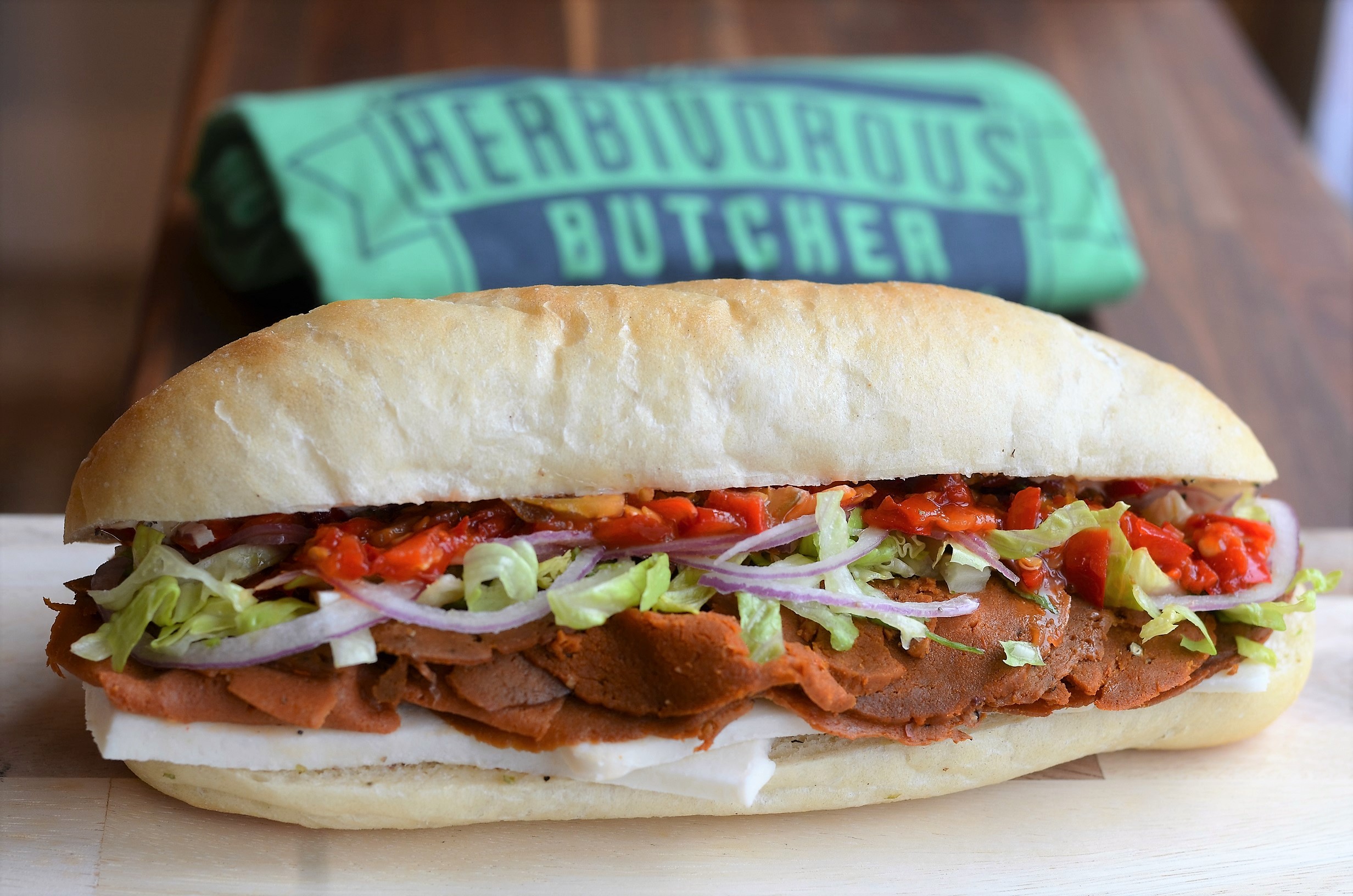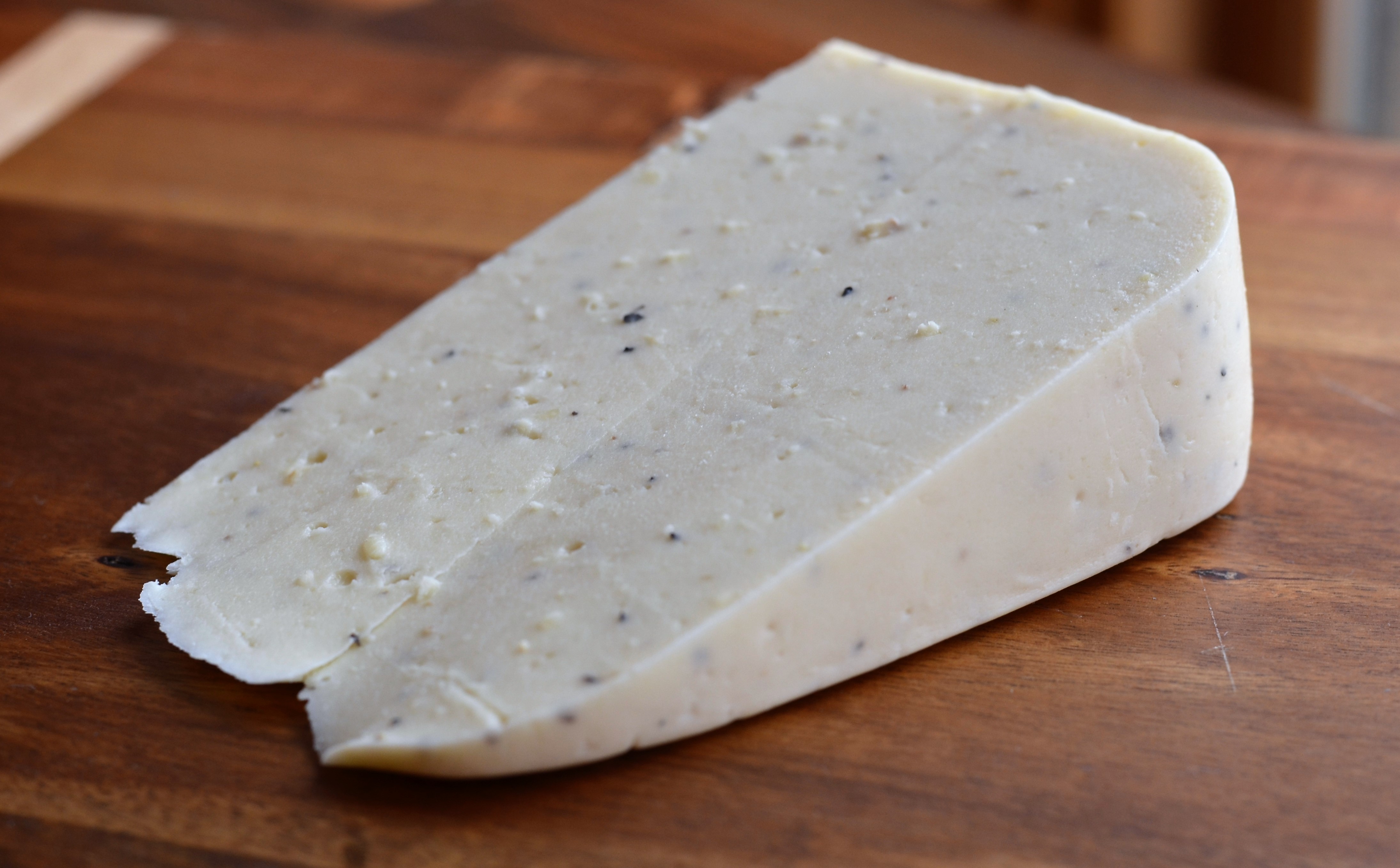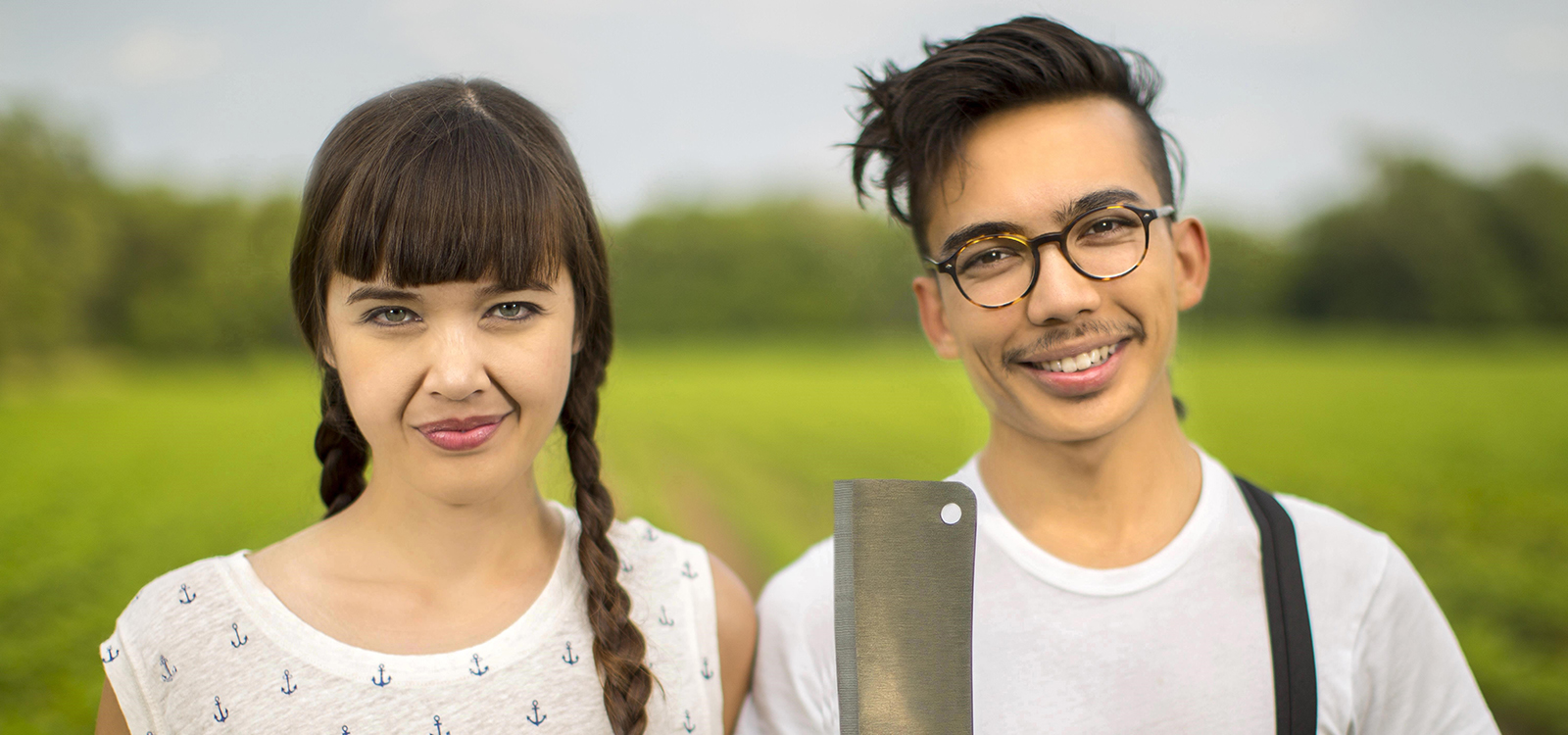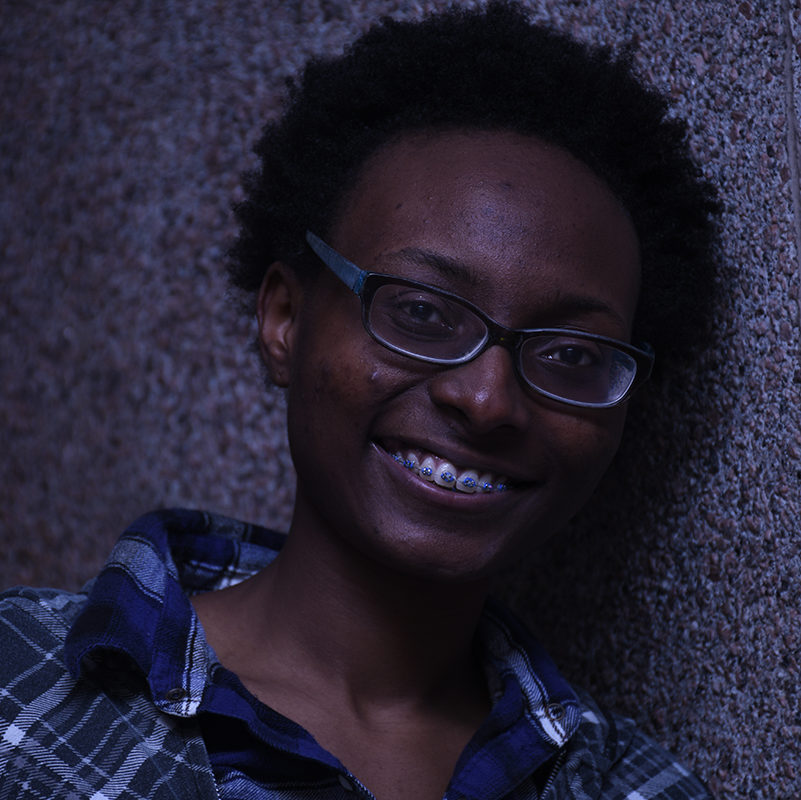This Brother and Sister Launched the U.S.’s First Vegan Butcher Shop

Complete with vegan pepperoni, pastrami, and capicola ham, the Italian cold cut garnered the attention of not only Minneapolis locals but Food Network’s Guy Fieri. Photo courtesy of Herbivorous Butcher.
NEHA: Can you tell me about growing up in Guam and how that influenced you?
Kale Walch: We grew up and things were moderately difficult for us. Our dad was always bouncing between jobs. We moved around a whole lot, and that was a big part of it. I came to the United States from Guam when I was 6 months old. Through it all, our mom would make us the food from the island we’re from, but I never really experienced the full family fiestas that they would have on the island. The food was my connection to them, and because of that, I got a passion for food. I didn’t think that would be a livelihood for me.
Then after high school, when I became vegan, I kind of got to combine two of my passions, which was very exciting. Even then, I didn’t think I would be a vegan butcher. I started making a lot of recipes and experimenting a whole lot. I guess that’s another thing during my childhood. We had to get creative a lot of the time to make ends meet, and that sort of determination and creativity that my parents instilled in me translated to all of the recipes, persevering through failed batches to get to the one good one.
NEHA: Can you tell me about how you became vegan?
K.W.: I went from eating Little Caesar’s pizza and Taco Bell every day to going full vegan off the bat. It was a pretty easy transition for me, I guess at first. I went vegan to lose weight because I was very overweight in high school, and it worked for me. All I ate was smoothies and salads, but I knew if that was all I ate, then I couldn’t stay vegan. I had to make these meat substitutes that were just as good as the ones I grew up with if I was to stay vegan.
NEHA: Was that difficult?
K.W.: It was not that hard for me back then because I was doing it for health purposes. If people want to go vegan, it is a whole lot easier than it was for me back then. I had to make the meat alternatives back then that were good enough to fill me because stuff on market was not really that great. These days there all these crazy products on the market that can make meat so wonderfully that no one will ever miss it.
NEHA: What inspired you to create a vegan butcher shop?
K.W.: My sister and I were just experimenting with recipes, and we kind of combined them one day. We realized that we had enough materials to sell them. We gave them to our friends, and they were super honest with us, and they told us the things sucked and what was really good. We took their criticisms and grew from them. We started a farmers market stall with the leftover tips money I had from work and what we had in reserve, and the rest is history.
NEHA: Can you walk us through the process to create the meat?
K.W.: It all depends on the recipe. Some meats are a two-day process. Some are a lot faster. Most of our meats are wheat-based. If you ever have had mock duck at a Chinese restaurant, it’s that same base. It is a high-protein wheat flour combined with a liquid, and that is very basically what our things are. That is the most basic recipe. What we have done is make various blends of juices, vinegars, and all kinds of spices to get a whole range of flavor and texture. We are still perfecting them, which is exciting for me because everyday is a little bit different. It is a very intensive process.
All of our butchers are really artisans. Most of the products come together in a day. Some of them we have to take over two days. Our jerky we make them on day one, and we wait for it cool overnight before we slice it the next day. So there are products that take two days, but mostly, they come together quickly.
NEHA: How does that process differ for cheese?
K.W.: I am the only one who makes the cheeses. It is a very labor-intensive process. I may be stirring a pot of cheese for like six hours a day. It is very thin to start with and then it thickens up. It is almost like concrete by the end. It’s labor alone, but there’s so many moving parts to it. Even a tablespoon less of salt that I might forget can affect the flavor of the whole thing. If I didn’t have the heat high enough, it could affect the whole thing. If I didn’t quite stir it right, that would screw up the whole process. It’s very meticulous. There are a lot of ways it could go wrong, but I perfected it at this point. Most of my cheeses are soy milk and coconut oil based, and we also have some almond cheeses.

Each vegan cheese needs hours of stirring and attention to ensure that the flavor and texture emulates their dairy-based counterparts. The perfect blend of roasted garlic and cracked black pepper made this havarti a hit among customers. Photo by the Herbivorous Butcher.
NEHA: How does it feel to be an innovator—opening the first vegan butcher shop?
K.W.: We were the first in the world at that time. There was a vegetarian butcher shop in Europe that made a lot of meats, but they weren’t vegan. We were the first all-vegan one, and it was definitely humbling. We didn’t think it would work, but a lot of people have been following our example these days. We are seeing that these butchers are popping up all over the country and the world. It’s very exciting to prove to people that it’s something that could work. That small ripple that we made is starting to get a big wave.
NEHA: What was the most difficult part of starting the shop?
K.W.: We would work 18-hour days, my sister and I. We both had our full-time jobs. I was a server, and she worked as a bookkeeper. Then we would go to the kitchen and cook all night. Those were hard days, but we were so passionate about it. It did not feel like anything.
But I would say the hardest part would just be that day at the farmer’s market when we just were not really sure if it was going to work. We rolled up with coolers full of meat and said if we don’t sell anything, at least we have a lot of food we can eat. Even for that the first year, even though we would sell a lot and sell out almost every day, I was always unsure of myself that it was actually the best, and that it was actually good. I thought that these people were just being nice. Over time, I started to believe that this really was the best stuff around.
NEHA: How many years did you spend going to the farmers markets before the shop was built?
K.W.: We did the farmers market for two years. Our shop was under construction in 2015, and we opened up in 2016.
NEHA: What is your most popular meat and cheese item?
K.W.: The most popular meat we have is the Korean rib. That was actually a mistake that I made years ago. I was trying to make smoky house ribs, and I screwed up the liquid ingredients. It kind of tasted a bit like a Korean barbeque, and I thought that I could make a sauce and make this work. That accident became our most popular product. We wholesale those Korean ribs all across the country. We have more than 100 wholesale partners all around the country, and that is very exciting.
I think our most popular cheese right now would have to be our cheddar. I definitely make more mozzarella than anything because a lot of pizza joints get our stuff. In the store, we’ve got three different kinds of sandwiches each week: our turkey havarti, our Italian cold cut, and our rotating hot-press sandwich. Those sandwiches sell like crazy.
NEHA: How do you serve non-Minneapolis customers?
K.W.: We mail to domestic consumers. We ship boxes to people’s doors with ice packs. We do a lot of those. They come from all around the country. We ship to Hawaii, Alaska, and all over. Most of them go to California and New York.
NEHA: What other projects are you working on?
K.W.: We have an animal sanctuary on the side that we are constantly fundraising for. That is a place for battered animals and rescue animals. We have two pigs right now that fell off of a slaughterhouse truck, so we are raising them. We don’t have a permanent farm just yet, but we’re raising money. Hopefully, we will get one open by the end of this year, if everything goes well.
NEHA: Why is veganism so important to you?
K.W.: I think veganism transcends compassion not just toward animals. What excites me about it is that helps create a feeling of empathy. You can extend that toward an animal and understand that an animal’s suffering is a big part of your dinner tonight. If you can make that connection, it is a lot easier to make that connection with other people. Maybe you can go the extra mile to help someone who is really in need. I think it is just like a domino effect once it gets going. I think that veganism has the power to change the world.
NEHA: Why did you decide to have an animal sanctuary connected to the vegan butcher shop?
K.W.: We want people to have the full experience. We want people being able to have a place to encounter these beings, maybe for the first time. To hang out with a pig all day and realize that pigs are incredibly smart, and maybe bacon isn’t worth it. We are not here to change people, to change people’s minds. We are here to provide information and try to bridge a gap between people. Not to push it down anyone’s throat or anything, just being kind.
NEHA: How do you see your business growing in the future?
K.W.: We have been looking at Los Angeles, maybe something in Seattle, and maybe something in the South. We have big plans. We just want to make sure we are doing it right.
Banner photo courtesy of The Herbivorous Butcher.




